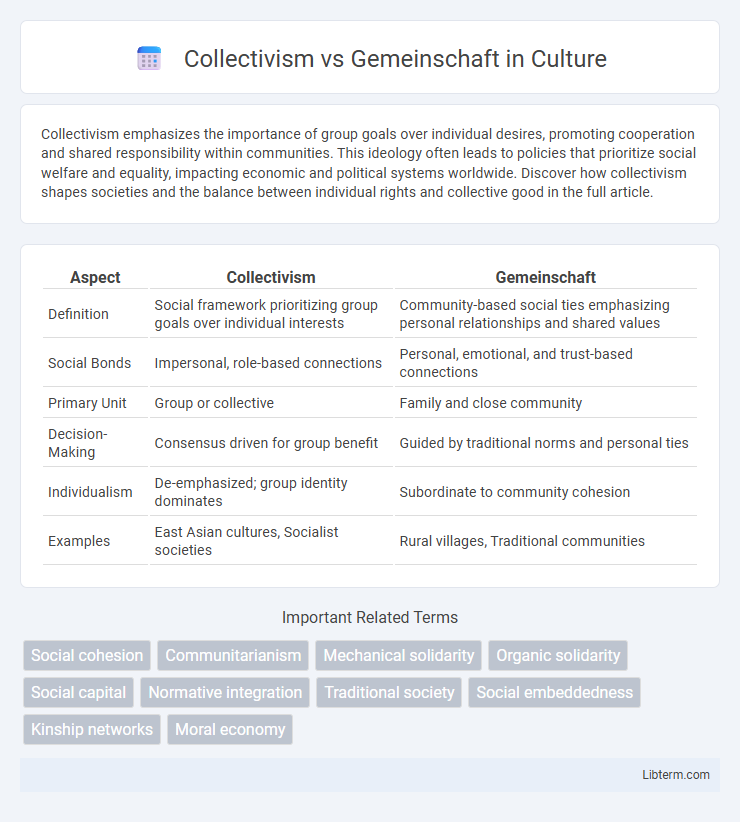Collectivism emphasizes the importance of group goals over individual desires, promoting cooperation and shared responsibility within communities. This ideology often leads to policies that prioritize social welfare and equality, impacting economic and political systems worldwide. Discover how collectivism shapes societies and the balance between individual rights and collective good in the full article.
Table of Comparison
| Aspect | Collectivism | Gemeinschaft |
|---|---|---|
| Definition | Social framework prioritizing group goals over individual interests | Community-based social ties emphasizing personal relationships and shared values |
| Social Bonds | Impersonal, role-based connections | Personal, emotional, and trust-based connections |
| Primary Unit | Group or collective | Family and close community |
| Decision-Making | Consensus driven for group benefit | Guided by traditional norms and personal ties |
| Individualism | De-emphasized; group identity dominates | Subordinate to community cohesion |
| Examples | East Asian cultures, Socialist societies | Rural villages, Traditional communities |
Understanding Collectivism: Core Principles
Collectivism centers on prioritizing the group's needs over individual desires, emphasizing shared goals, interdependence, and social cohesion. Its core principles include mutual support, collective responsibility, and the belief that a community's welfare is paramount for individual well-being. This approach contrasts sharply with individualistic perspectives by highlighting the importance of cooperation and unity within social groups.
Defining Gemeinschaft: The Essence of Community
Gemeinschaft is defined by close-knit relationships, shared values, and a strong sense of belonging that characterize traditional communities. This social structure emphasizes personal interactions, mutual support, and collective well-being over individual interests. Rooted in family ties, long-term acquaintances, and communal norms, Gemeinschaft fosters social cohesion that strengthens cultural continuity and communal identity.
Historical Roots of Collectivism and Gemeinschaft
Collectivism originates from ancient agricultural societies where cooperation and shared labor ensured survival, emphasizing group goals over individual interests. Gemeinschaft, a concept introduced by sociologist Ferdinand Tonnies in the late 19th century, describes community bonds based on close personal relationships, kinship, and shared values rooted in rural, traditional societies. Both concepts highlight social cohesion but emerge from different historical contexts: collectivism from economic interdependence and Gemeinschaft from intimate social ties.
Key Differences Between Collectivism and Gemeinschaft
Collectivism emphasizes the prioritization of group goals over individual desires, fostering social cohesion through shared values and collective responsibility. Gemeinschaft, a concept introduced by Ferdinand Tonnies, highlights intimate, personal relationships typical of traditional communities, where social ties are characterized by close-knit bonds and mutual obligations. Key differences include the nature of social connections, with collectivism focusing on group integration and Gemeinschaft emphasizing organic, family-like relationships.
Social Bonds: Group Identity vs. Personal Relationships
Collectivism emphasizes strong group identity, where social bonds are maintained through shared goals, values, and collective responsibilities that prioritize the welfare of the group over individual desires. Gemeinschaft, by contrast, fosters personal relationships characterized by intimate, long-lasting social ties rooted in family, tradition, and emotional connections. These contrasting social bonds shape how communities coordinate, support members, and maintain social cohesion within cultural contexts.
Influence on Political and Economic Systems
Collectivism emphasizes group goals and community welfare, shaping political systems toward socialism or communism, where resources and power are distributed to benefit the collective. Gemeinschaft, characterized by close-knit, personal relationships often found in traditional societies, influences political structures that prioritize local governance and social cohesion, promoting economic systems based on mutual aid and cooperation. Both frameworks affect policy-making and economic strategies by either prioritizing collective ownership and equality or fostering community-based support systems and decentralized decision-making.
Individual Autonomy Within Collective Societies
Individual autonomy within collectivist societies such as Gemeinschaft emphasizes the balance between personal freedom and community cohesion, where social roles and mutual responsibilities shape decision-making processes. Unlike purely individualistic cultures, Gemeinschaft values interconnectedness, promoting collective welfare while still allowing personal expression within established social norms. This dynamic fosters environments where identity and autonomy are negotiated through shared traditions, familial bonds, and long-term relationships.
Gemeinschaft in Modern Communities
Gemeinschaft in modern communities emphasizes close-knit social ties, shared values, and a strong sense of belonging rooted in family, tradition, and long-term relationships. This social structure fosters cooperation and mutual support, often seen in rural villages or intentional communities where personal trust and collective well-being are prioritized. Unlike individualistic frameworks, Gemeinschaft nurtures communal identity and social cohesion through face-to-face interactions and emotional bonds.
The Role of Tradition in Shaping Social Structures
Tradition plays a crucial role in shaping social structures by fostering Gemeinschaft, where close-knit communities emphasize shared customs, values, and collective identity, promoting social cohesion and stability. In collectivism, tradition underpins group loyalty and interdependence, guiding behavior through established norms that maintain harmony and mutual support within the society. The preservation of traditional practices in both frameworks reinforces continuity and helps individuals understand their roles and responsibilities within the social fabric.
Impacts on Social Cohesion and Conflict
Collectivism emphasizes group goals and interdependence, fostering strong social cohesion through shared values and mutual support, which reduces interpersonal conflicts by prioritizing harmony. Gemeinschaft, characterized by close-knit, traditional communities, enhances social cohesion with deep-rooted personal relationships and collective identity, minimizing conflicts via established social norms and face-to-face interactions. Both frameworks promote social stability but may suppress individual dissent, potentially leading to latent tensions beneath the surface of apparent unity.
Collectivism Infographic

 libterm.com
libterm.com